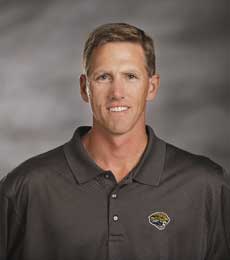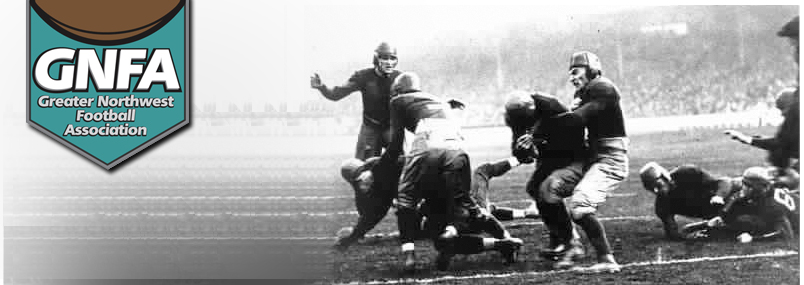|
Bryan Barker

Former Auburn Panther
(1986) and Warhawk (1987) Punter's Journey to the NFL
Bryan Barker
officially filed his retirement papers with the NFL this
past spring (2007) after 16 years and 236 games with six teams.
Barker started his career with the Kansas City Chiefs in
1990 and played his final game with the St. Louis Rams in
2005. After sitting out the 2006 season, Barker decided to
call it a career with a 42.1 career punting average.
“I stayed in shape in 2006 in case a team needed a punter
midseason,” said Barker. “I didn’t get a call and I have a
lot of other things going on that I want to focus on, so I
decided that the time was right. I was ready to move on.”
Solely based on the numbers, Barker had a remarkable career.
1,132 punts, 878 consecutive punts without a block (2nd
all-time in NFL history), 326 career punts inside the 20
(3rd all-time in NFL history), NFL All-Rookie Team, 1997
Pro-Bowler, and three NFL Mackey Awards (conference’s best
punter). He also finished his career two-for-two throwing
the ball, including a 22-yard pass against Pittsburgh on
Monday Night Football. Those numbers, however, only begin to
tell the story of Barker’s career as a professional punter.
That story begins back on the campus of Santa Clara
University.
Barker arrived on the Mission Campus from Orinda as a
freshman in the fall of 1982 with the idea of playing
football for the
Broncos. He had played safety, back-up quarterback and
punter at Miramonte High School. After a summer of
practicing his punting,
he thought that punter would be his best shot of making
legendary Santa Clara coach Pat Malley’s Broncos team.
“The equipment manager gave me 91 as my number because he
thought I had no shot of making the team that year,”
recalled Barker. “Getting that number motivated me, because
I wanted to prove that I belonged. Once I made the team,
they tried to give me a different number, but I stuck with
91 for that first year.”
Barker not only made the squad, but he grabbed the starter’s
job and did not relinquish it for four seasons. He thrived
for the Broncos, helping them to a 7-4 mark (3-1 in the
Western Football Conference) in his freshman season, tying
the school record with 74 punts. “He was always a
hard-worker and would not take no for an answer,” said SCU
classmate Jim Tanner ’86. “Every year he would beat out the
entire team on the run up the dam in Los Gatos. It was
pretty amazing to have the punter do that.”
One of his most stunning accomplishments at SCU came during
his junior season in a victory over Humboldt State. Barker
crushed an 81-yard punt in the game, the second longest punt
in school history. “He really hit that punt very hard,” said
former Bronco head coach Terry Malley. “You don’t see kicks
like that very often. That was just a vintage kick and I
don’t think I have seen one like that for a long, long
time.” Prior to his senior season, Barker and the Bronco
community suffered the tragic loss of head coach Pat Malley
to cancer. Barker, like many Bronco football players,
credits Malley for a lot of his success on the football
field and in life.
“Pat was the face of Santa Clara athletics,” said Barker.
“He really embodied the spirit and ideals of the Santa Clara
community and he had a big impact on me. There was not a
better person that I could have met as my first contact at
Santa Clara.” Pat’s son, Terry, took over for his father as
the head coach for Barker’s final season on the Mission
Campus. The Broncos went 8-2-1 and won the Western Football
Conference that season, as Malley was named the conference
coach of the year. Barker finished his collegiate career as
the Broncos all-time leader in punts with 248 and his 49.8
punt average against Humboldt State set the school record
for a single game.
Upon graduation from Santa Clara, Barker’s football saga
really began, as he had no concrete offers from the NFL.
“The hardest thing for a punter is that there are hundreds
of colleges with football and only 32 NFL teams,” said Terry
Malley. “Bryan had to really work at it to get noticed and
then to prove himself.” Following his best lead, Barker
moved to Seattle. One of the Seahawks scouts was Phil Neri,
a former Bronco player who played under Pat Malley.
Unfortunately, the Seahawks drafted a punter that year and
Barker ended up with the semi-pro Auburn Panthers. “Signing
with the Panthers was nice at first, but they started
winning
every game comfortably and they barely needed to punt,”
noted Barker. “I had to ask the owner if I could switch
teams so that I could get more chances to punt. Luckily, he
knew that my goal was to reach the NFL and he let me to go
to the worst team in the league.”
In 1987, Barker was playing with the Southside Warhawks in
Tacoma when the NFL strike began and was invited to attend
training camp as a replacement player. However, sticking to
his principles, Barker turned down the opportunity. The
following year, Barker finally got himself into the Denver
Broncos training camp, but head coach Dan Reeves cut him
before the season started. After a year of coaching, Barker
then signed a contract with the Seahawks and was one of two
punters in camp.
Again, the road would not be easy, as he was cut by Chuck
Knox. “Even though I had not made it yet, I felt good about
my chances,” said Barker. “Each year, I got a little bit
more of a taste and in 1989, I played in some preseason
games. I knew I was close and that my chance would come.”
That chance came in 1990, in spite of one final obstacle.
Marty Schottenheimer, then the coach of the Kansas City
Chiefs, brought Barker in to training camp with one other
punter. On the night of the last cut, Barker was told he had
the job only to learn just a few hours later that the
coaches had changed their minds. The story would finally
have a happy ending for Barker, as he was called in to
replace the other punter after three games.
He played his first game against the Cleveland Browns at
Arrowhead Stadium and would never look back, playing 16
consecutive seasons in football’s best league. “The reality
of making it to the NFL really hit me that first game,” said
Barker. “I remember looking out on the field and thinking
how great it was to make it. A few weeks later, we played
the Raiders and I was in awe, because that was my team as a
kid.” Barker made an immediate impact with some very good
Chiefs teams that featured Christian Okoye, Derrick Brooks,
Steve DeBerg and later on, Joe Montana. The 1990 Chiefs went
11-5 and reached the divisional round of the playoffs.
“Bryan had the skills to punt in the league and was a guy
you could just always count on,” said Schottenheimer. “He
almost never had a punt blocked because he was such a great
athlete. He could handle all the snaps and get the ball away
quickly and accurately.”
Barker was named to the All-Rookie team his first year and
then averaged over 40 yards a punt in his next three seasons
to establish himself as one of the top punters in the
league. He not only was excelling on the field, but he was
recognized as a great teammate and one of the hardest
workers on the team. “He was arguably our hardest worker,”
said Schottenheimer. “Also, his interaction with the team
was excellent and his teammates all held him in high regard.
He took his job very seriously and the team noticed that and
respected him for it. Th e fact that he was so athletic and
could throw the ball also helped him win respect.”
As his career was starting to take off on the field, Barker
also became a leader off the field, getting himself heavily
involved in community outreach endeavors. “I am as proud of
Bryan for his efforts in the community as I am for his
success in the NFL,” said Malley. “Helping out in the
community that you live in is something that we stressed at
Santa Clara to our players and he really took that to
heart.” Barker and his wife, Leah, started the Let Us Play
Foundation that annually sponsors Let Us Play Sports Camp
for girls and the Let Us Play Junior 2K for kids in
Jacksonville, Fla. He has now started organizing Let Us Play
camps in a number of other NFL cities to bring his message
around the country. NFL Charities has even given him grants
for the camps, which are designed to motivate inner-city
girls to see the benefits associated with sports and
education. “Giving back has always been important to my wife
and me,” said Barker. “It was just natural to get involved.”
After leaving the Chiefs in 1993 and spending the 1994
season with the Philadelphia Eagles, Barker signed with the
expansion Jacksonville Jaguars in 1995 and enjoyed the best
years of his career. With the Jaguars, he twice won the
Mackey Award, given to the AFC’s best punter, made the 1997
Pro Bowl and the 1997 All-Pro team. With Barker the Jaguars
twice made it to the AFC Championship Game (1997, 1999) and
won back-to-back division titles in 1998 and 1999.
In 2001, he was reunited with Schottenheimer in Washington
with the Redskins, where he spent three seasons. He
attempted a career high 90 punts in his first year there.
Despite reaching his 40s, Barker’s numbers did not slip and
he continued to average a high number of kicks inside the
opponents’ 20-yard line. After 16 games in Green Bay in
2004, Barker finished his career with the Rams in 2005,
averaging 42.7 yards per punt, his best average since 1998.
With his NFL career behind him, Barker now has more time to
focus on his foundation as well as a number of other
projects that he is involved with, including coordinating
the Jaguars Alumni Group and overseeing a company, Argus
Benefits, that he co-owns.
|



